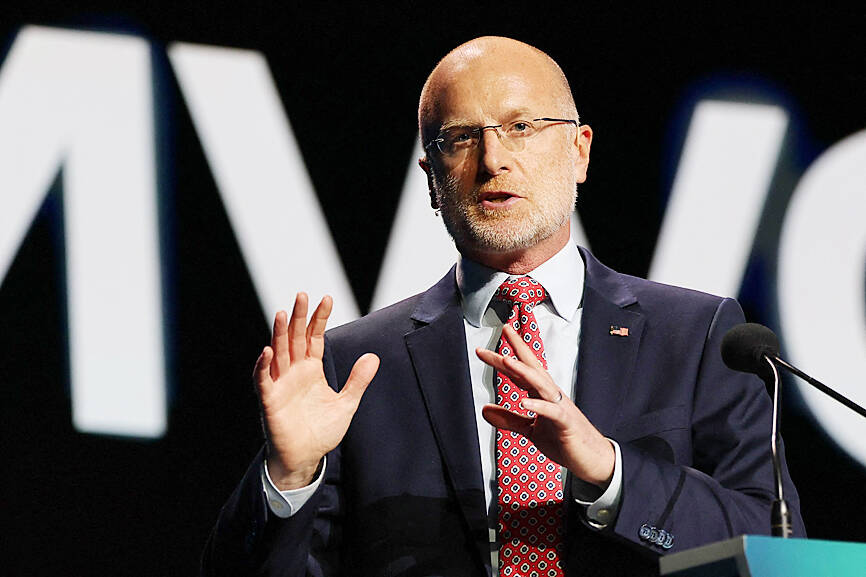The US Federal Communications Commission (FCC) on Friday said it is investigating nine Chinese companies including Huawei Technologies Co (華為), ZTE Corp (中興通訊), Hangzhou Hikvision Digital Technology Co (杭州海康威視數字技術), China Mobile Ltd (中國移動) and China Telecom Corp (中國電信) to determine if they are seeking to evade US restrictions.
The Chinese companies have all been placed on the FCC’s “Covered List” that deems specific communications equipment and services pose a threat to US national security.
The companies may be still operating in the US, because they do not believe the designation prohibits particular types of operations, FCC Chair Brendan Carr said.

Photo: AFP
Other companies under investigation include Hytera Communications Corp (海能達通訊), Dahua Technology Co (大華技術), Pacifica Networks/ComNet (信通電話) and China Unicom (Americas) Operation Ltd.
It is the latest in a series of actions against Chinese telecom and technology firms by Washington. The FCC previously barred the Chinese companies from providing telecommunications services in the US, citing national security concerns.
The FCC has reason to believe the Chinese firms on the list “are trying to make an end run around those FCC prohibitions by continuing to do business in America on a private or ‘unregulated’ basis,” Carr said.
The FCC “will identify the scope of their ongoing activities and move quickly to close any loopholes that have permitted untrustworthy, foreign adversary state-backed actors to skirt our rules,” he said.
The FCC’s investigation is seeking detailed information about ongoing US businesses and information about other companies that might be aiding US operations.
The FCC said it sent letters of inquiry and at least one subpoena to the companies.
It last year advanced efforts to step up security of the Border Gateway Protocol, which is central to the Internet’s global information routing system.

Greek tourism student Katerina quit within a month of starting work at a five-star hotel in Halkidiki, one of the country’s top destinations, because she said conditions were so dire. Beyond the bad pay, the 22-year-old said that her working and living conditions were “miserable and unacceptable.” Millions holiday in Greece every year, but its vital tourism industry is finding it harder and harder to recruit Greeks to look after them. “I was asked to work in any department of the hotel where there was a need, from service to cleaning,” said Katerina, a tourism and marketing student, who would

i Gasoline and diesel prices at fuel stations are this week to rise NT$0.1 per liter, as tensions in the Middle East pushed crude oil prices higher last week, CPC Corp, Taiwan (台灣中油) and Formosa Petrochemical Corp (台塑石化) said yesterday. International crude oil prices last week rose for the third consecutive week due to an escalating conflict between Israel and Iran, as the market is concerned that the situation in the Middle East might affect crude oil supply, CPC and Formosa said in separate statements. Front-month Brent crude oil futures — the international oil benchmark — rose 3.75 percent to settle at US$77.01

Merida Industry Co (美利達) has seen signs of recovery in the US and European markets this year, as customers are gradually depleting their inventories, the bicycle maker told shareholders yesterday. Given robust growth in new orders at its Taiwanese factory, coupled with its subsidiaries’ improving performance, Merida said it remains confident about the bicycle market’s prospects and expects steady growth in its core business this year. CAUTION ON CHINA However, the company must handle the Chinese market with great caution, as sales of road bikes there have declined significantly, affecting its revenue and profitability, Merida said in a statement, adding that it would

UNCERTAINTIES: The world’s biggest chip packager and tester is closely monitoring the US’ tariff policy before making any capacity adjustments, a company official said ASE Technology Holding Inc (日月光投控), the world’s biggest chip packager and tester, yesterday said it is cautiously evaluating new advanced packaging capacity expansion in the US in response to customers’ requests amid uncertainties about the US’ tariff policy. Compared with its semiconductor peers, ASE has been relatively prudent about building new capacity in the US. However, the company is adjusting its global manufacturing footprint expansion after US President Donald Trump announced “reciprocal” tariffs in April, and new import duties targeting semiconductors and other items that are vital to national security. ASE subsidiary Siliconware Precision Industries Co (SPIL, 矽品精密) is participating in Nvidia